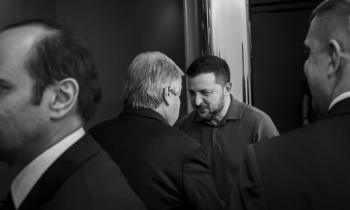A Push For Peace: International Day of Peace against the backdrop of the 78th Session of the United Nations General Assembly: An analysis by Nyeri Otero Flanagan

During the 1950s, under the sombre shadow of the Second World War, people from across nations donated medals and coins to fashion a bell with the simple message “Long live absolute world peace” inscribed on its side. The chimes of this Peace Bell now take centre stage during the celebration of International Day of Peace, on the 21st of September every year.
This year, the theme for reflection during the International Day of Peace was “Actions for peace: Our ambition for the #GlobalGoals”, which was appropriate with 2023 also marking the mid-point towards the achievement of the 2030 Agenda for Sustainable Development. Of the seventeen Sustainable Development Goals (SDGs), Goal 16 is often referred to as the peace goal, and it calls on countries to work towards “Peace, Justice and Strong Institutions”. Beyond building ceasefires and peace agreements, countries are encouraged to tackle the root causes of conflict to achieve peace by peaceful means.
In the wake of ever more severe global crises, what does it mean to act for peace?
In his address during the celebration of the International Day of Peace this year, the UN Secretary-General (SG), Antonio Guterres, highlighted how peace is central to achieving many SDGs. As he explained, a push for peace involves conflict prevention and solidarity as a global society in order to address discrimination, support sustainable green development, and promote diverse and broad opportunities for women and girls.
This year, as part of the International Day of Peace, the UN hosted a special event on Youth for Peace, where enthusiastic participation illustrated the commitment of young people to supporting a just and sustainable peace. At the forum, the SG’s Envoy on Youth, Jayathma Wickramanayake, echoed the emphasis made by the SG, stating that “Peace is the result of action”. She also stressed the importance of tackling conflicts at their core, “underscoring the need for dignity and development for peace”.
So, do the proposals made at the General Assembly constitute actions towards peace?
The International Day of Peace also coincides with the annual opening of the United Nations General Assembly (UNGA). During the opening week of the UNGA, heads of states commented on the challenges we face as a global community and highlighted the lack of robust action. Whether speaking in the UNGA hall or participating in one of the summits that took place at the same time, world leaders made repeated calls for reform of the multilateral system. They advocated for the creation of a new system with the resources needed to build sustainable peace, and with the ability to renew trust within the international community. World leaders repeatedly articulated the need for multilateralism to be more representative of social, political and economic realities. Notably, there was a substantial call for Security Council (SC) reform, with some calling for a change in the power of the veto.
Currently, the SC is comprised of five permanent members (P5) and ten non-permanent members. The P5 is made up of the United States of America (US), the United Kingdom, France, China and Russia, and they hold the power to veto resolutions. While regarded by some as a safeguard and promoter of international stability, this veto power is controversial at the UN, with many members considering it the most undemocratic element of the institution. This was voiced by Ukraine, with President Zelenskiy’s statement calling for systemic transformation. Particularly innovative in his statement, was the call for a shift of power towards the UNGA that would allow this body to vote to overrule the veto of any permanent member of the SC (P5). In the context of the Russian invasion of Ukraine, Zelenskiy’s statement promoted greater representation with the intention of creating the more just and strong institutions needed to promote peace.
Moreover, during this year’s UNGA, countries highlighted the impact of climate change. They emphasized the ever-more urgent need for robust action in the face of the enormous challenge that climate change represents for achieving all parts of the 2030 Agenda. Brazil, Sri Lanka and Costa Rica were particularly explicit, calling out the lack of investment in efforts to address climate change and SDG action, in opposition of the record levels of global investment in militarisation.
Reflecting on the International Day of Peace amidst the backdrop of the UNGA, we can see that, despite peace being prioritised in Goal 16, all seventeen goals require and build on each other. This makes it vital to have peaceful actions at the heart of all work towards the SDGs. By taking action to fulfil the SDGs, we take steps towards peace.
Photo Credit: UN Photo/Mark Garten
Photo Caption: Volodymyr Zelenskyy (centre right), President of Ukraine, greets Secretary-General António Guterres (centre left) before addressing the general debate of the General Assembly’s seventy-eighth session.


